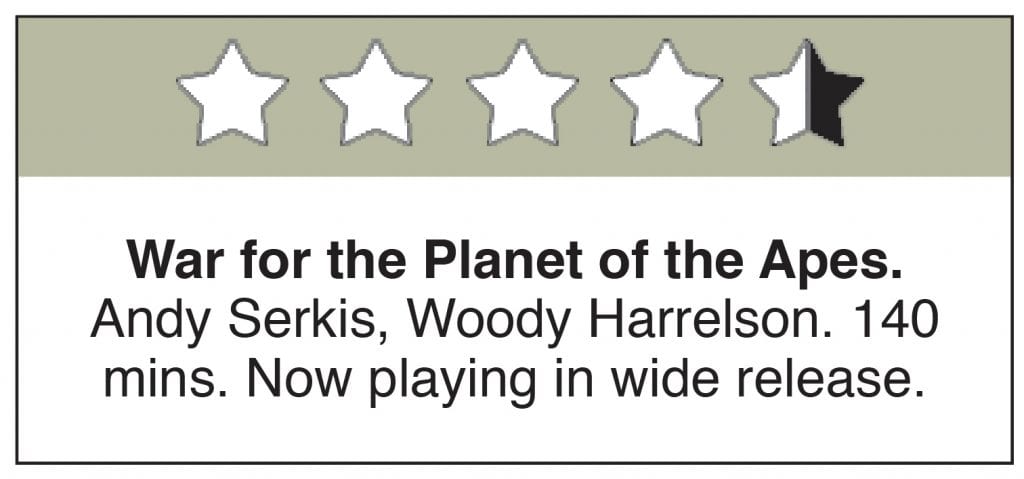‘War for the Planet of the Apes’ is the best Hollywood film of the year. Seriously
ARNOLD WAYNE JONES | Executive Editor
jones@dallasvoice.com
The 1968 film Planet of the Apes was one of those game-changers in filmmaking: A smart but thrilling sci-fi action movie with a great twist and makeup effects that revolutionized what audiences would come to expect. Its four immediate sequels — Beneath, Return, Conquest and Battle — despite varying levels of quality dipped continuously in box-office draw. The last two were just sad. A remake in 2001 drew widespread ire, and the franchise died.
At least it seemed that way. Then someone got the notion to do prequels to the original — not to trod the same ground as before, but set the scene for how we got ourselves in this mess as the subservient species. The 2011 re-launch, Rise of the Planet of the Apes, was cliché-ridden nonsense, entertaining technologically but sloppily conceived. But when Matt Reeves took over as director — with 2014’s Dawn and now War for the Planet of the Apes, which he also co-wrote — the game has changed again. There is moral weight as well as emotional ambiguity in this tale of Darwinism let loose: Humans are nearing extinction as always, but the apes seem less like conquerors than slaves in revolt. All that’s missing is a gibbon named Spartacus to make the metaphor clear: Mankind’s desire to survive is irrelevant. Our species is doomed, and being assholes about it doesn’t improve anything. Claiming superiority as you attempt your own brand of genocide can only be called origin of the specious.
It’s strange, that compulsion to cheer for the primate whose destiny, in the universe of all the Apes movies, is to eventually enslave humans. But as any vegan on the street will tell you, welcome to the eco-system from downstream. Makes you wish you’d been nicer to the earth’s fauna, doesn’t it?
It’s not an exaggeration to say this new Apes film is, amid this summer’s sea of disappointing and even insulting studio whizbangs (Baywatches, Mummies, Transformers, Spider-Men, Carses and Aliens), not only stands tall against its competition, it holds its own as fully satisfying filmmaking on its own — that is, War isn’t just good by comparison, it’s damned good, period.
Being the third installment, the filmmakers are empowered to take more risks and challenge expectations. That means killing off major characters, upping the stakes, ending on a period instead of an ellipses. And Reeves indulges in all of that.
When it opens, Caesar (Andy Serkis again in a masterful acting job via motion-capture and digital enhancement) is weary and resigned to let his colony survive separate from humans in the forests of Northern California. He’s hoping for détente if not outright brokered peace. Except a rogue military man known as The Colonel (Woody Harrelson) will have none of it. When the humans fortify themselves with simian slave labor and attack the apes’ compound, killing one too many chimps, Caesar sends his tribe on a trek to safety and engages in a suicide mission to destroy the last stronghold of humans. (Think Lord of the Rings without the jewelry.)
The mythic nobility of the quest trope can feel cliché, but Reeves imbues the journey with the weight of Native American self-preservation against the onslaught of the American West — Caesar as Sitting Bull to The Colonel’s insane, Kurtzian Custer. With his small band of loyalists, Caesar befriends a young human who has lost the power of speech (a portend for why humanity is seriously disadvantaged in this battle) and learns something of higher-level civilization: He embodies human values more than the humans themselves.
All the while, Reeves plants seeds that serve as Easter eggs to the old franchise (names like Nova and Cornelius get their origins) and comments on present-day politics (The Colonel is building a great wall… and he’s gonna make the monkeys pay for it!). Visually, he concentrates so much on the eyes of the actors (human and ape) that he fills the screen not always with violence and action, but with real connection. There’s even enough content to see it as a religious allegory without drowning in Christian symbolism.
In the post-Trump, post-Brexit era of cultural self-immolation, War for the Planet of the Apes posits that mankind is not only doomed, and not only did it set the pattern for its own fall, but it isn’t worth saving anyway. In the right moment, it’s hard to argue with that kind of reasoning. Apres nous, le deluge.
This article appeared in the Dallas Voice print edition July 14, 2017.



